Top 10 Worst Video Game Sequels
The world of video gaming is a landscape of epic adventures, thrilling quests, and unforgettable characters. It's an arena where creativity knows no bounds, where imagination is the only limit, and where epic sequels can take a beloved franchise to new, electrifying heights. But, just like in any form of entertainment, things don't always go as planned. This brings us to a particularly prickly question that has ignited debates among gamers around the globe: "What are the worst video game sequels?"Now, hold onto your controllers, folks. This topic is a roller-coaster ride, fraught with tales of misguided concepts, failed executions, and disheartening letdowns. Yes, we're talking about those sequels that, rather than carrying forward the triumphant legacy of their predecessors, seemed to fumble, stumble, and fall flat on their pixelated faces.
 Duke Nukem Forever, released after over a decade of development, failed to meet the lofty expectations set by its predecessor. With dated graphics, underwhelming gameplay mechanics, and a lack of the original's wit and charm, this sequel simply couldn't live up to the Duke Nukem legacy.
Duke Nukem Forever, released after over a decade of development, failed to meet the lofty expectations set by its predecessor. With dated graphics, underwhelming gameplay mechanics, and a lack of the original's wit and charm, this sequel simply couldn't live up to the Duke Nukem legacy. Twelve years in the making, yet it still sucked badly. Dear GearBox and 2K, when you do cancel a game, make sure it isn't restarted after Ben "Yahtzee" Croshaw releases a joke review online.
I hate it with a burning passion.
 Bubsy 3D, unfortunately, didn't translate the franchise's platforming charm into the 3D realm successfully. The controls were clunky, the graphics uninspiring, and the overall design lacked the intuitive feel that made the earlier games enjoyable.
Bubsy 3D, unfortunately, didn't translate the franchise's platforming charm into the 3D realm successfully. The controls were clunky, the graphics uninspiring, and the overall design lacked the intuitive feel that made the earlier games enjoyable. What happened to the 2d bubsy games that I loved... ? He's dead because of this horrible game.
Worst game in history of mankind.
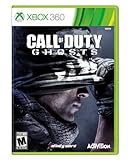 Call of Duty: Ghosts, despite some interesting concepts, failed to hit the high marks of its predecessors. Fans criticized it for its underwhelming campaign, forgettable characters, and lackluster multiplayer, making it a low point in the series for many.
Call of Duty: Ghosts, despite some interesting concepts, failed to hit the high marks of its predecessors. Fans criticized it for its underwhelming campaign, forgettable characters, and lackluster multiplayer, making it a low point in the series for many.
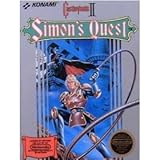 Castlevania II: Simon's Quest veered away from the successful formula of its predecessor with its cryptic puzzles and day-night cycle, leaving players more frustrated than thrilled. The game's departure from straightforward action-platforming was a decision that many fans felt missed the mark.
Castlevania II: Simon's Quest veered away from the successful formula of its predecessor with its cryptic puzzles and day-night cycle, leaving players more frustrated than thrilled. The game's departure from straightforward action-platforming was a decision that many fans felt missed the mark. I'm pretty sure the AVGN reviewed this in his first episode. Seriously, would you ever guess that you're supposed to get pass the wall by crouching down with a red diamond & wait for a tornado to come? Somebody did a hacked version of it, and it's totally better.
It's not the worst of video games, but it is the worst of castlevania. You always read, "what a horrible night to have a curse" and "the morning sun has vanquished the horrible night"
Although the soundtrack was still great the gameplay however fails and falls apart
 Halo 4, while boasting impressive visuals, fell short when it came to replicating the winning formula of its predecessors. The storytelling seemed lackluster, and changes to multiplayer mechanics left many fans of the original trilogy feeling alienated.
Halo 4, while boasting impressive visuals, fell short when it came to replicating the winning formula of its predecessors. The storytelling seemed lackluster, and changes to multiplayer mechanics left many fans of the original trilogy feeling alienated. 343i killed the franchise with this game, then violated the corpse with halo 5. Stick to the Bungie games because those are the real Halo games.
 Rabbids Land, designed as a Wii U party game, failed to capitalize on the unique features of the console. With a limited number of mini-games and uninspired gameplay mechanics, it was seen as a step back from the usual mayhem and hilarity the Rabbids franchise is known for.
Rabbids Land, designed as a Wii U party game, failed to capitalize on the unique features of the console. With a limited number of mini-games and uninspired gameplay mechanics, it was seen as a step back from the usual mayhem and hilarity the Rabbids franchise is known for.
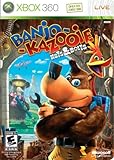 Banjo-Kazooie: Nuts & Bolts diverged from its beloved platforming roots to focus on vehicle construction and combat. This fundamental shift disappointed fans of the franchise, who were longing for a more traditional sequel to the original games.
Banjo-Kazooie: Nuts & Bolts diverged from its beloved platforming roots to focus on vehicle construction and combat. This fundamental shift disappointed fans of the franchise, who were longing for a more traditional sequel to the original games.
 Sonic the Hedgehog (2006), intended to be a reboot for the franchise, suffered from poor level design, frustrating controls, and a multitude of technical glitches. These factors, combined with an unexpectedly serious storyline, resulted in a Sonic game that didn't feel like Sonic at all.
Sonic the Hedgehog (2006), intended to be a reboot for the franchise, suffered from poor level design, frustrating controls, and a multitude of technical glitches. These factors, combined with an unexpectedly serious storyline, resulted in a Sonic game that didn't feel like Sonic at all.
 Tony Hawk's Pro Skater 5, a much-anticipated installment in the beloved skateboarding series, was marred by numerous technical issues. Lackluster level designs, poorly implemented mechanics, and a myriad of glitches disappointed long-time fans and newcomers alike.
Tony Hawk's Pro Skater 5, a much-anticipated installment in the beloved skateboarding series, was marred by numerous technical issues. Lackluster level designs, poorly implemented mechanics, and a myriad of glitches disappointed long-time fans and newcomers alike.
 Street Fighter IV, while reviving the franchise and introducing it to a new generation, faced criticism for its art style and character designs. Additionally, the implementation of the Focus Attack mechanic was met with mixed reception, adding a level of complexity that not all players appreciated.
Street Fighter IV, while reviving the franchise and introducing it to a new generation, faced criticism for its art style and character designs. Additionally, the implementation of the Focus Attack mechanic was met with mixed reception, adding a level of complexity that not all players appreciated.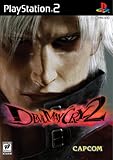 Devil May Cry 2 didn't capture the essence of the original that fans had grown to love. Its uninspiring storyline, simplified combat, and the toning down of protagonist Dante's personality resulted in a sequel that felt inferior to the original.
Devil May Cry 2 didn't capture the essence of the original that fans had grown to love. Its uninspiring storyline, simplified combat, and the toning down of protagonist Dante's personality resulted in a sequel that felt inferior to the original.
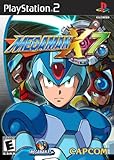 Mega Man X7 tried to modernize the series by adding 3D sections but ultimately fell short of the mark. The change in gameplay mechanics, coupled with a lack of polish in the new elements, made it a disappointing addition to the beloved franchise.
Mega Man X7 tried to modernize the series by adding 3D sections but ultimately fell short of the mark. The change in gameplay mechanics, coupled with a lack of polish in the new elements, made it a disappointing addition to the beloved franchise.
 Paper Mario: Color Splash, although visually striking, was criticized for its combat system and the shift away from the RPG elements that fans adored in the original games. Despite its charming humor and aesthetics, many felt it wasn't a true Paper Mario sequel.
Paper Mario: Color Splash, although visually striking, was criticized for its combat system and the shift away from the RPG elements that fans adored in the original games. Despite its charming humor and aesthetics, many felt it wasn't a true Paper Mario sequel. It was okay, but according to other Paper Mario games, it let us down.
 Iron Man 2 for the DS failed to deliver an engaging superhero experience. With underwhelming graphics, repetitive missions, and lackluster combat, it was unable to truly capture the thrill of donning Tony Stark's iconic suit.
Iron Man 2 for the DS failed to deliver an engaging superhero experience. With underwhelming graphics, repetitive missions, and lackluster combat, it was unable to truly capture the thrill of donning Tony Stark's iconic suit. The first one was bad too I think..
 Resident Evil 6 deviated significantly from the survival horror roots of the franchise, adopting a more action-oriented approach. Fans critiqued its lack of atmospheric horror, convoluted narrative, and emphasis on action over suspense, making it a divisive entry in the series.
Resident Evil 6 deviated significantly from the survival horror roots of the franchise, adopting a more action-oriented approach. Fans critiqued its lack of atmospheric horror, convoluted narrative, and emphasis on action over suspense, making it a divisive entry in the series. I know there are some who love this monstrosity, but it's ruined the Resident Evil franchise. On the plus side, at least Capcom have learnt from their mistake and returning how the franchise used to be: Survival Horror.
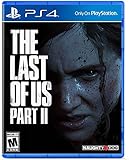 The Last of Us Part II, while technically impressive, faced criticism for its narrative decisions and character arcs. Despite its high production values, many players felt it did not live up to the emotional resonance and storytelling excellence of the first game.
The Last of Us Part II, while technically impressive, faced criticism for its narrative decisions and character arcs. Despite its high production values, many players felt it did not live up to the emotional resonance and storytelling excellence of the first game. This game is an amazing and polished game. So why do I vote this game? Because it's also got a terrible story. Weird Sex scenes, Filled with politics few agree with and also tries to shame you. It's just a real mixed bag
Last of Us 1 had the potential to be a massive franchise making media for years to come, until LoU2 sabotaged that potential and made this franchise an sjw joke. Play only the original because that's the only one that matters.
 Bomberman Act: Zero made drastic changes to the classic Bomberman formula, with its darker tone and futuristic setting, but these changes didn't resonate with fans. Combined with its repetitive gameplay and lack of local multiplayer, the game fell short of its predecessors' explosive charm.
Bomberman Act: Zero made drastic changes to the classic Bomberman formula, with its darker tone and futuristic setting, but these changes didn't resonate with fans. Combined with its repetitive gameplay and lack of local multiplayer, the game fell short of its predecessors' explosive charm. The first one was okay, but this is just trash.
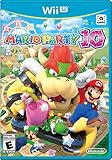 Mario Party 10, with its new 'Bowser Party' and 'amiibo Party' modes, strayed from the individual board gameplay that was a staple of the series. Despite adding variety, these changes resulted in a less engaging and competitive multiplayer experience for many fans.
Mario Party 10, with its new 'Bowser Party' and 'amiibo Party' modes, strayed from the individual board gameplay that was a staple of the series. Despite adding variety, these changes resulted in a less engaging and competitive multiplayer experience for many fans. It's not that bad, but again, according to Mario Party games.
 Spyro: Enter the Dragonfly was a step back from the high-flying adventures of the purple dragon in his previous outings. Hindered by numerous glitches, long loading times, and uninspiring level design, it failed to reignite the spark that made the original trilogy so memorable.
Spyro: Enter the Dragonfly was a step back from the high-flying adventures of the purple dragon in his previous outings. Hindered by numerous glitches, long loading times, and uninspiring level design, it failed to reignite the spark that made the original trilogy so memorable. Spyro was a masterpiece, but since Insomniac left...
This game ruined my whole childhood.
 BioShock Infinite, while lauded for its unique setting and narrative ambition, was criticized for its deviation from the gameplay formula that defined the first two games. The more action-heavy approach and changes in mechanics made it feel less like a BioShock game to some fans.
BioShock Infinite, while lauded for its unique setting and narrative ambition, was criticized for its deviation from the gameplay formula that defined the first two games. The more action-heavy approach and changes in mechanics made it feel less like a BioShock game to some fans. The first one was terrific, this one was terrible.
 Super Mario Bros 2, originally a different game in Japan titled Doki Doki Panic, was a drastic departure from the original Super Mario Bros. Its gameplay mechanics and lack of familiar enemy characters alienated some players, making it a controversial sequel despite its unique charm.
Super Mario Bros 2, originally a different game in Japan titled Doki Doki Panic, was a drastic departure from the original Super Mario Bros. Its gameplay mechanics and lack of familiar enemy characters alienated some players, making it a controversial sequel despite its unique charm. This game was kind of cheesy compared to the first and the third one.
The first and third were awesome, but this one never was.
Shigeru Miyamoto had a good reason why he maid this Mario 2 in the USA and not the lost levels
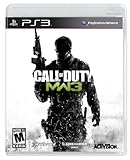 Call of Duty: Modern Warfare 3, despite high sales, faced criticism for its lack of innovation. Critics felt that the campaign was formulaic, and while the multiplayer remained robust, many argued it was time for the series to freshen up its approach.
Call of Duty: Modern Warfare 3, despite high sales, faced criticism for its lack of innovation. Critics felt that the campaign was formulaic, and while the multiplayer remained robust, many argued it was time for the series to freshen up its approach.
 Crackdown 2, despite its ambitious open-world design, was considered by many as a letdown due to its repetitive gameplay and lack of narrative depth. Fans felt it didn't build enough on the foundations of its predecessor, making it feel more like an expansion than a true sequel.
Crackdown 2, despite its ambitious open-world design, was considered by many as a letdown due to its repetitive gameplay and lack of narrative depth. Fans felt it didn't build enough on the foundations of its predecessor, making it feel more like an expansion than a true sequel.
 Perfect Dark Zero, a prequel to the critically acclaimed Perfect Dark, was criticized for its underwhelming storyline and character development. It also introduced gameplay changes that didn't resonate with fans, such as regenerative health and simplified weapons, making it feel less strategic than its predecessor.
Perfect Dark Zero, a prequel to the critically acclaimed Perfect Dark, was criticized for its underwhelming storyline and character development. It also introduced gameplay changes that didn't resonate with fans, such as regenerative health and simplified weapons, making it feel less strategic than its predecessor.